The Peer-reviewed Newspaper publication series presents the outcome of a series of research/PhD workshops investigating contemporary digital culture. Since 2011, DARC has organized the workshops with transmediale festival Berlin, and included shifting partners from cultural as well as academic research institutions. At the workshops, participants interrogate the festival theme, but also reflect on possible relations to existing research practices, including peer-review, austerity measures, the scalability of research, and more. The participants are asked to write a paper and present it at a workshop. Based on this mode of peer-review they are then asked to shorten their research into the length of a newspaper article for distribution at the transmediale festival. Following the event, they are invited to submit a full version to a special issue of A Peer-reviewed Journal About [the selected research theme] (APRJA).

Edited by Christian Ulrik Andersen, Søren Pold, Nicolas Malevé, Magdalena Tyżlik-Carver, Pablo Velasco, Jussi Parikka, Ruben van de Ven, Megan Phipps, Christoffer Koch Andersen, Sami Itavuori, Matīss Groskaufmanis, Maja Funke, Katya Sivers, Daria Iuriichuk, Kola Heyward-Rotimi, Nico Daleman, Paul V. Schmidt, Maya Erin Masuda.
Design: Pablo Velasco
Web-to-print: Pablo Velasco, Nicolas, Malevé, Christian Ulrik Andersen
Infrastructure: CTP Server, mediawiki, paged.js, VSCodium
Organization: Pablo Velasco, Magda Tyzlik-Carver, Jussi Parikka, Søren Pold
ISSN (PDF): 2245-7607
This publication is the outcome of of the workshop "Everything is a matter of distance" held at Silent Green in Berlin, and presented at Haus der Kulturen der Welt as part of the transmediale festival, 2025. It functions as workshop 'proceedings'. Here, though, the word is used as a verb and an action; it interrogates how proximity and distance unfold in the production of academic writing, for instance the idea peer review, or the conventions of formats and formatting, or the use of particular software for text processing or print. To proceed with - a continuous action that unfolds in multiple ways, with multiple methods, across a shared space of inquiry, pulling things, concepts and bodies into and out of relations that can be processed or (mis)understood, or explained, or followed.
The contributions shift across different media - from sound to software, visual cultures to performance. The authors mobilize their knowledge in how bodies move, how cities move, how bodies are captured in algorithmic technologies, and what is not captured in the dynamics of near-distant-remote modes of sensing and modeling.
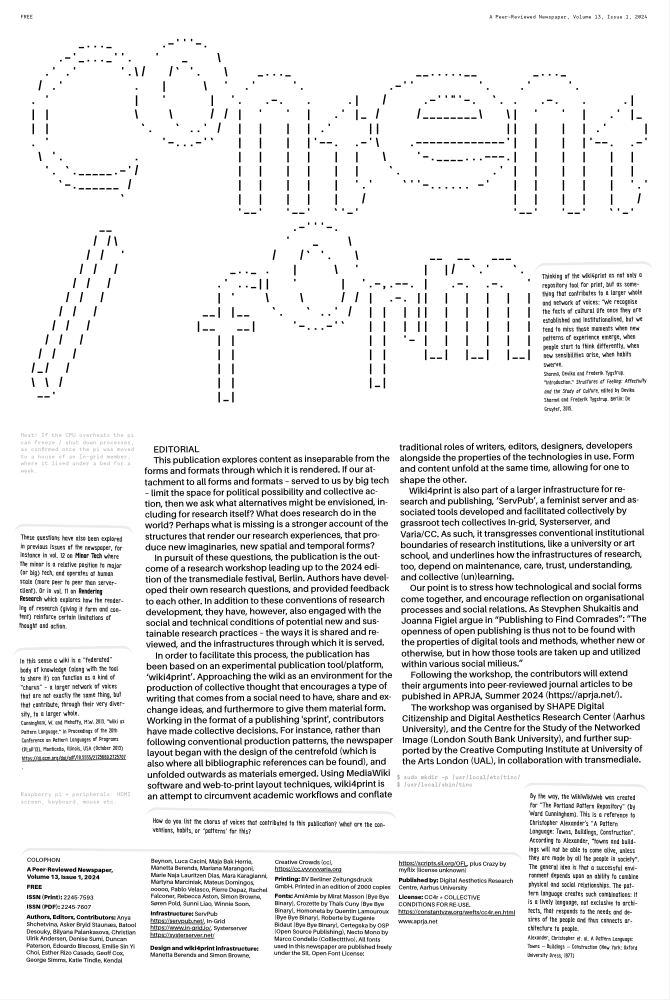
Edited by Christian Ulrik Andersen, Rebecca Aston, Kendal Beynon, Manetta Berends, Simon Browne, Luca Cacini, Esther Rizo Casado, Emilie Sin Yi Choi, Geoff Cox, Pierre Depaz, Mateus Domingos, Rachel Falconer, Marie Naja Lauritzen Dias, Martyna Marciniak, ooooo, Bilyana Palankasova, Duncan Paterson, Søren Pold, Mariana Marangoni, Anya Shchetvina, George Simms, Winnie Soon, Asker Bryld Staunæs, Denise Sumi, Katie Tindle, Pablo Velasco.
Design & wiki4print infrastructure: Manetta Berends and Simon Browne (CC)
Infrastructure: ServPub, In-Grid, Systerserver
ISSN (Print): 2245-7593
ISSN (PDF): 2245-7607
This publication explores content as inseparable from the forms and formats through which it is rendered. If our attachment to all forms and formats – served to us by big tech – serve to limit the space for political possibility and collective action, then we ask what alternatives might be envisioned, including for research itself? What does research do in the world? Perhaps what is missing is a stronger account of the structures that render our research experiences, that produce new imaginaries, new spatial and temporal forms?
The publication has been based on an experimental publication tool/platform, ‘wiki4print’. wiki4print is an attempt to circumvent academic workflows and conflate traditional roles of writers, editors, designers, developers alongside the properties of the technologies in use. Form and content unfold at the same time, allowing for one to shape the other.
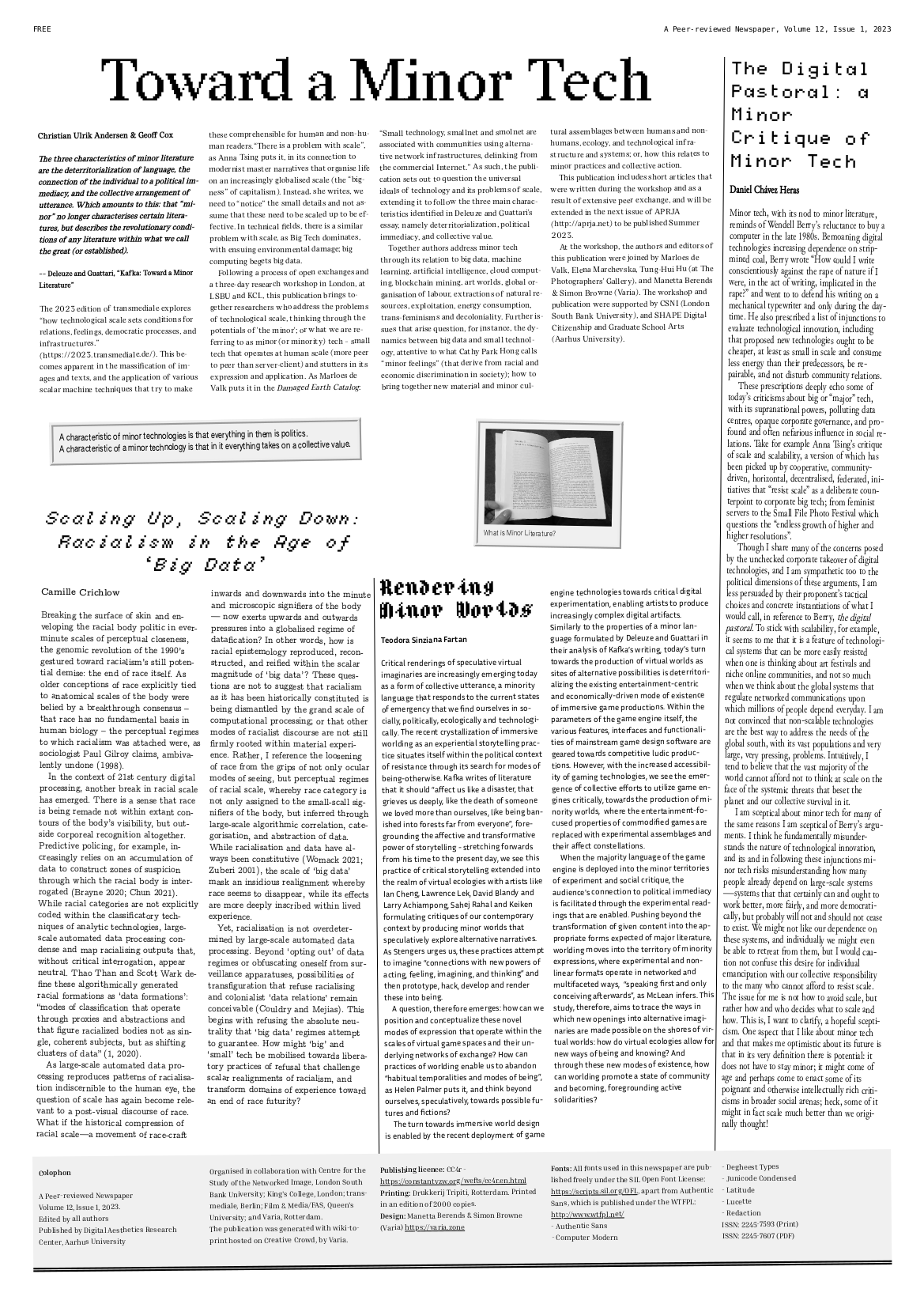
Edited by Christian Ulrik Andersen, Geoff Cox, Camille Crichlow, Mateus Domingos, Feminist Servers (mara karagianni & nate wessalowski), Teodora Sinziana Fartan, Susanne Förster, Inte Gloerich, Daniel Chávez Heras, Macon Holt, Jung-Ah Kim, Edoardo Lomi, Inga Luchs, Gabriel Menotti, Alasdair Milne, Anna Mladentseva, Shusha Niederberger, Søren Bro Pold, Roel Roscam Abbing, Winnie Soon, Magdalena Tyżlik-Carver, Varia, Jack Wilson, xenodata co-operative (Yasemin Keskintepe & Alexandra (Sasha) Anikina), Sandy Di Yu, Freja Kir
Design & Production: Manetta Berends and Simon Browne (Varia)
ISSN (Print): 2245-7593
ISSN (PDF): 2245-7607
Following a process of open exchanges and a three-day research workshop in London, at London South Bank University and King’s College, London, this publication brings together researchers who address the problems of technological scale, thinking through the potentials of 'the minor'; or what we are referring to as minor (or minority) tech – small tech that operates at human scale (more peer to peer than server-client) and stutters in its expression and application. As Marloes de Valk puts it in the Damaged Earth Catalog: “Small technology, smallnet and smolnet are associated with communities using alternative network infrastructures, delinking from the commercial Internet.” As such, the publication sets out to question the universal ideals of technology and its problems of scale, extending it to follow the three main characteristics identified in Deleuze and Guattari's essay (Toward a Minor Literature), namely deterritorialization, political immediacy, and collective value.
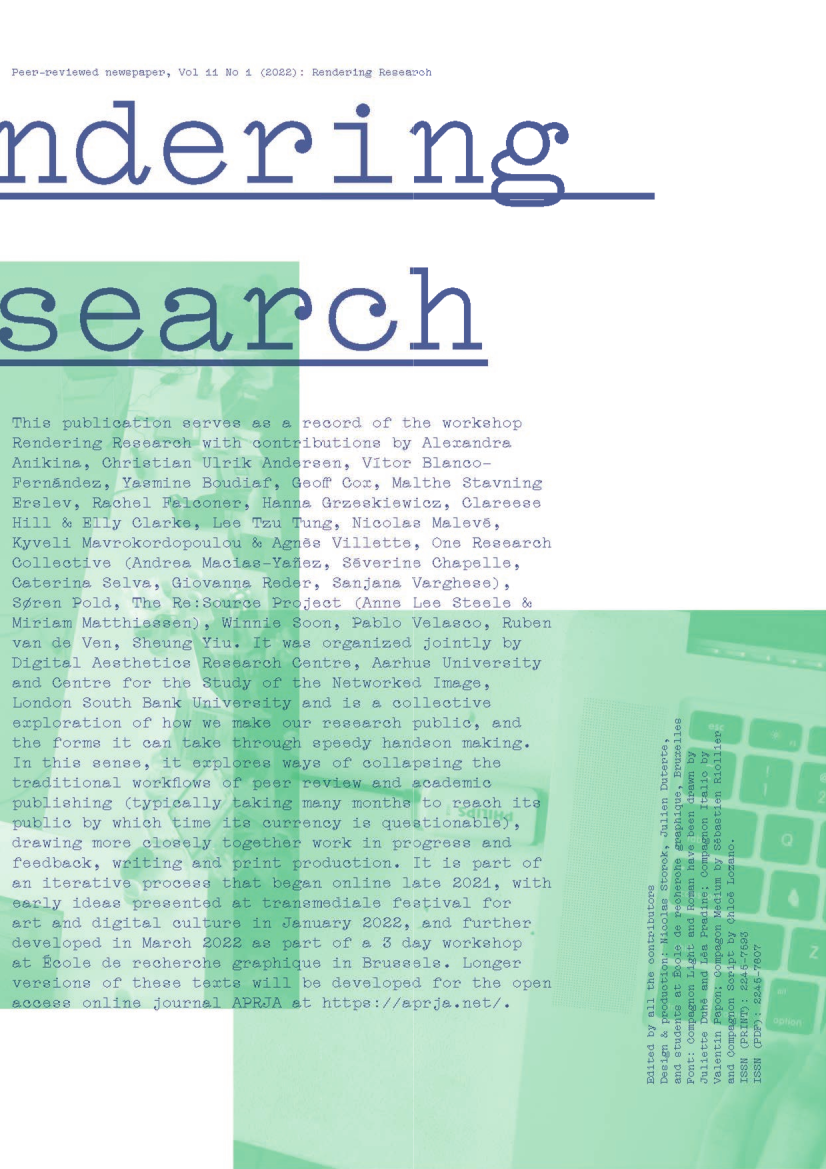
Edited by Alexandra Anikina, Christian Ulrik Andersen, Vítor Blanco-Fernández, Yasmine Boudiaf, Geoff Cox, Malthe Stavning Erslev, Rachel Falconer, Hanna Grześkiewicz, Clareese Hill & Elly Clarke, Lee Tzu Tung, Kyveli Mavrokordopoulou & Agnès Villette, One Research Collective (Andrea Macias-Yañez, Séverine Chapelle, Caterina Selva, Giovanna Reder, Sanjana Varghese), Søren Pold, The Re:Source Project (Anne Lee Steele & Miriam Matthiessen), Winnie Soon, Pablo Velasco, Ruben van de Ven, Sheung Yiu
Design & Production: Nicolas Storck, Julien Duterte, and students at École de recherche graphique, Bruxelles.
ISSN (PRINT): 2245-7593
ISSN (PDF): 2245-7607
This publication serves as a record of the workshop "Rendering Research", organized jointly by Digital Aesthetics Research Centre, Aarhus University and Centre for the Study of the Networked Image, London South Bank University – a collective exploration of how we make our research public, and the forms it can take through speedy hands-on making. In this sense, it explores ways of collapsing the traditional workflows of academic publishing (typically taking many months to reach its public by which time its currency is questionable), drawing more closely together work in progress and feedback, writing and print production (using e.g., free and open source software and risograph print). It is part of an iterative process that began online late 2021. Early ideas were presented at transmediale festival for art and digital culture in January 2022, and in March 2022 as part of a 3 day workshop at École de recherche graphique in Brussels, where this publication was produced.
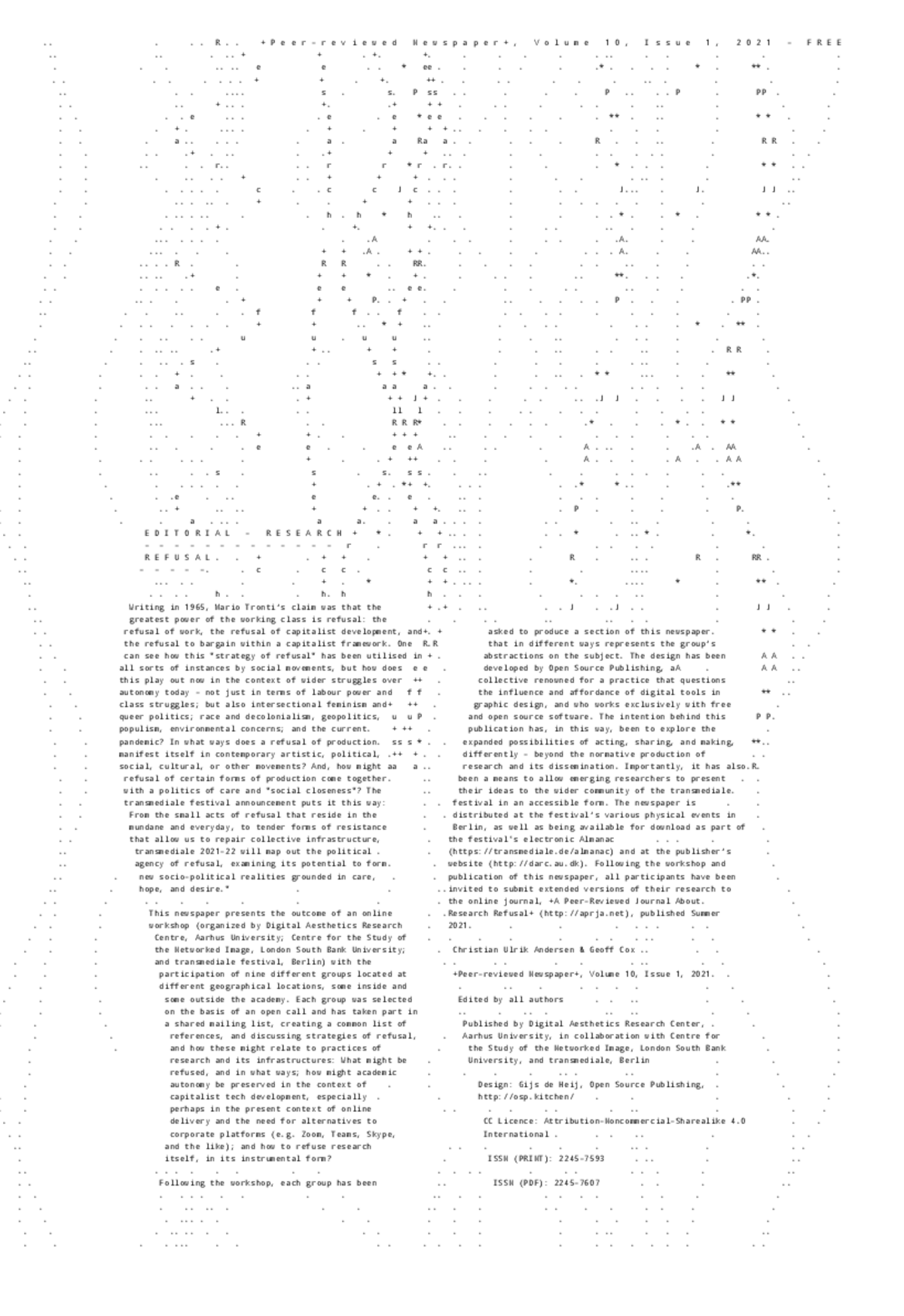
Edited by Bucles, Bad Bitch Link Up, CSNI, DARC, GOVERNANCE, Logistical (B)orders, MELT, not working group, Nothing Happening Here,
Design: Gijs de Heij, Open Source Publishing, Brussels
ISSN (PRINT): 2245-7593
ISSN (PDF): 2245-7607
Writing in 1965, Mario Tronti’s claim was that the greatest power of the working class is refusal: the refusal of work, the refusal of capitalist development, and the refusal to bargain within a capitalist framework. One can see how this "strategy of refusal" has been utilised in all sorts of instances by social movements, but how does this play out now in the context of wider struggles over autonomy today – not just in terms of labour power and class struggles; but also intersectional feminism and queer politics; race and decolonialism, geopolitics, populism, environmental concerns; and the current pandemic? In what ways does a refusal of production manifest itself in contemporary artistic, political, social, cultural, or other movements? And, how might a refusal of certain forms of production come together with a politics of care and "social closeness" – also when thinking of how research itself might be refused?
This newspaper issue presents the outcome of an online workshop (organized by Digital Aesthetics Research Centre, Aarhus University; Centre for the Study of the Networked Image, London South Bank University; and transmediale festival, Berlin) with the participation of nine different groups, selected on the basis of an open call (Autumn 2020), and located at different geographical locations, some inside and some outside academia. Each group has worked independently, but has also taken part in a shared mailing list, creating a common list of references, and produced a newspaper as part of the transmediale festival ‘almanac’ (summer 2021).
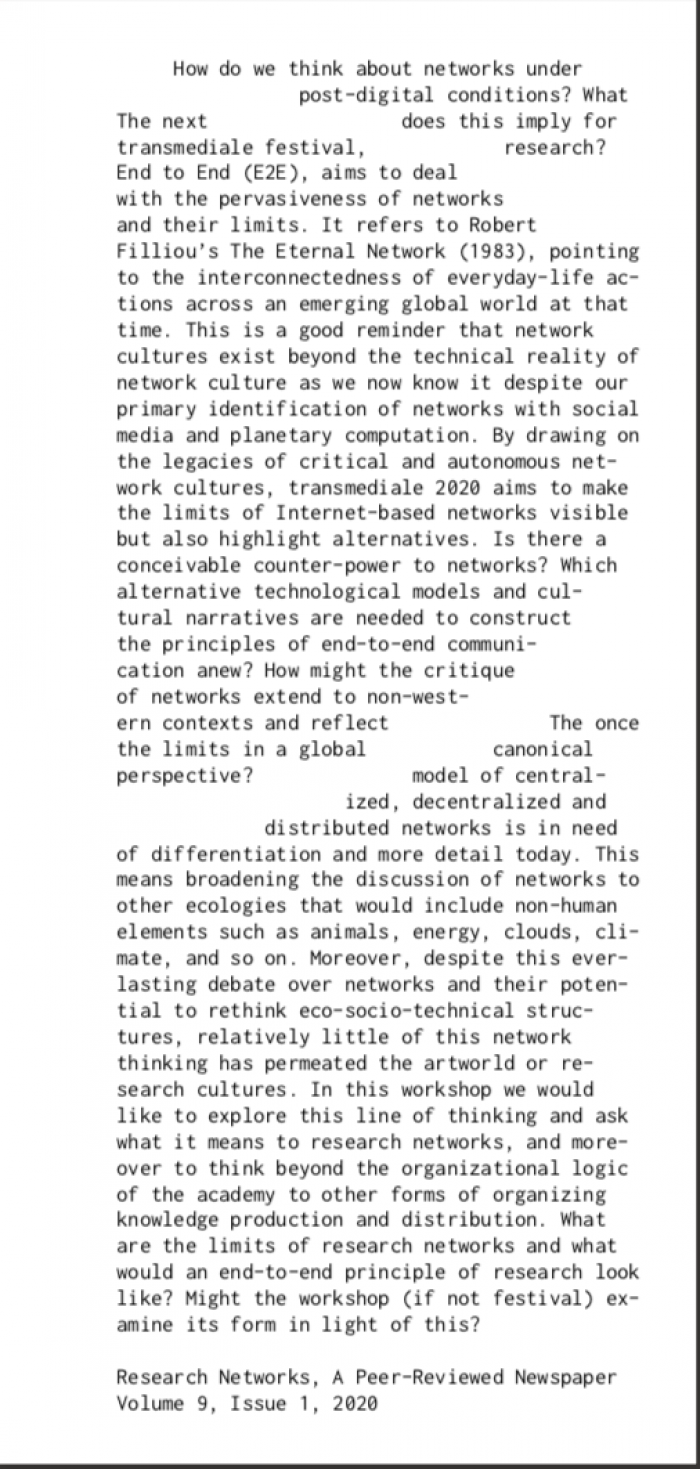
Edited by Christian Ulrik Andersen, Clemens Apprich, Sudipto Basu, Wenhao Bi, Nicola Bozzi, Geoff Cox, Maria Dada, Iuliia Glushneva, Naja Grundtmann, Rebecca Holt, Ozgun Eylul Iscen, Linda Kronman, Wing Ki Lee, Joshua Neves, Rodrigo Ochigame, Juan Pablo Pacheco, Søren Pold, Cristina Ribas, Maximilian Schlüter, Tatjana Seitz, Winnie Soon, Magda Tyzlik-Carver, Giseli Vasconcellos, Tatiana Wells.
Design: Open Source Publishing, Brussels
ISSN (PRINT): 2245-7593
ISSN (PDF): 2245-7607
This publication is a raw unedited record of mail list exchanges in advance of a research workshop at the Canadian Embassy in Berlin (29-30 Jan 2020) and public presentations at Volksbühne (31 Jan 2020), as part of transmediale 2020 End to End which aimed to deal with the pervasiveness of networks and their limits. By drawing on the legacies of critical and autonomous network cultures, contributions discuss whether there is a conceivable counter-power to networks? Which alternative technological models and cultural narratives are needed to construct the principles of end-to-end communication anew? How might the critique of networks extend to non-western contexts and reflect the limits in a global canonical perspective?
The workshop leading to this publication is a collaboration between Digital Aesthetics Research Centre (Aarhus University), Centre for the Study of the Networked Image (London South Bank University), Global Emergent Media (GEM) Lab, Concordia University, and transmediale. The workshop was part of the Marshall McLuhan Salon at the Canadian Embassy in Berlin.
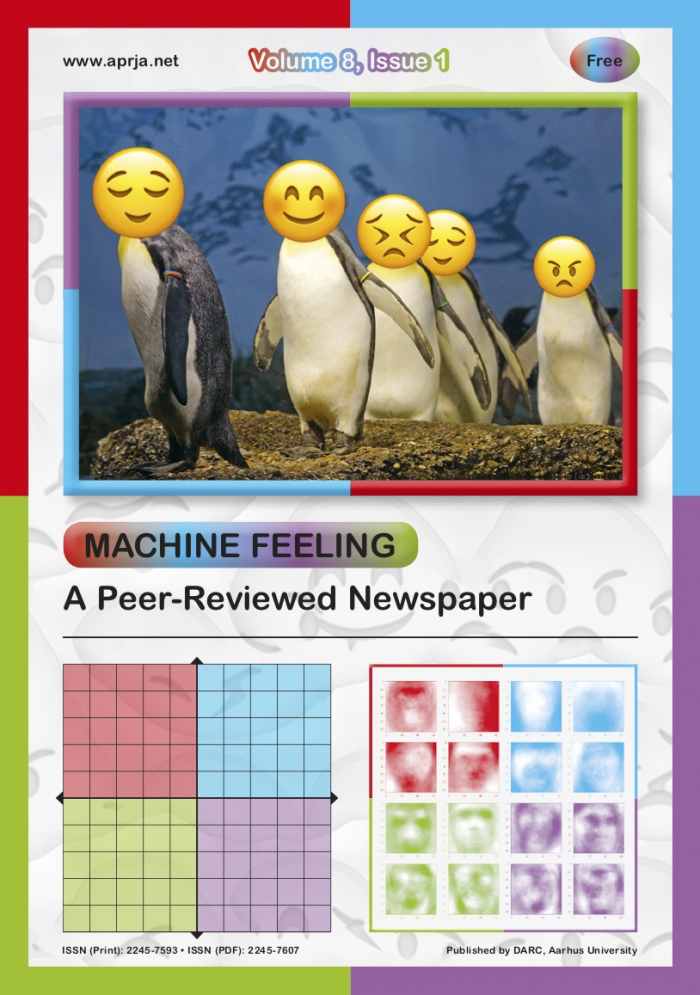
Edited by Christian Ulrik Andersen, Anne Alexander, Mitra Azar, Alan Blackwell, Anja Breljak, Geoff Cox, Michela De Carlo, Maria Dada, Iain Emsley, Malthe Stavning Erslev, Jennifer Gabrys, Daniel Chavez Heras, Kristoffer Gansing, Tomasz Hollanek, Leonardo Impett, Maike Klein, Rosemary Lee, Carleigh Morgan, Carman Ng, Matteo Pasquinelli, Sascha Pohflepp, Søren Pold, Irina Raskin, Tiara Roxanne, Winnie Soon, Magda Tyzlik-Carver, Rebecca Uliasz, Tanja Wiehn, Martin Zeilinger, Brett Zehner
Design: The Laboratory of Manuel Bürger: Simon Schindele, Bárbara Acevedo Strange, Manuel Bürger
ISSN (PRINT): 2245-7593
ISSN (PDF): 2245-7607
This publication presents abstracts and abstractions developed through a workshop held at University of Cambridge, and organized in collaboration between transmediale festival, Aarhus University, and Cambridge Digital Humanities Learning Programme. It presents a critical inquiry into new technologies of feeling, recognizing that digital culture has become instrumental for capturing and managing what Raymond Williams’ would once have called “structures of feeling”—referring to lived experiences and cultural expressions, distinct from supposedly fixed social products and institutions. It focuses specifically on the domain of machine learning and on the ability of technologies to capture and structure feelings and experiences that are active, in flux, and in the present.
The workshop leading to this publication is a collaboration between Digital Aesthetics Research Centre (Aarhus University), Cambridge Digital Humanities Learning Programme (University of Cambridge), and transmediale.
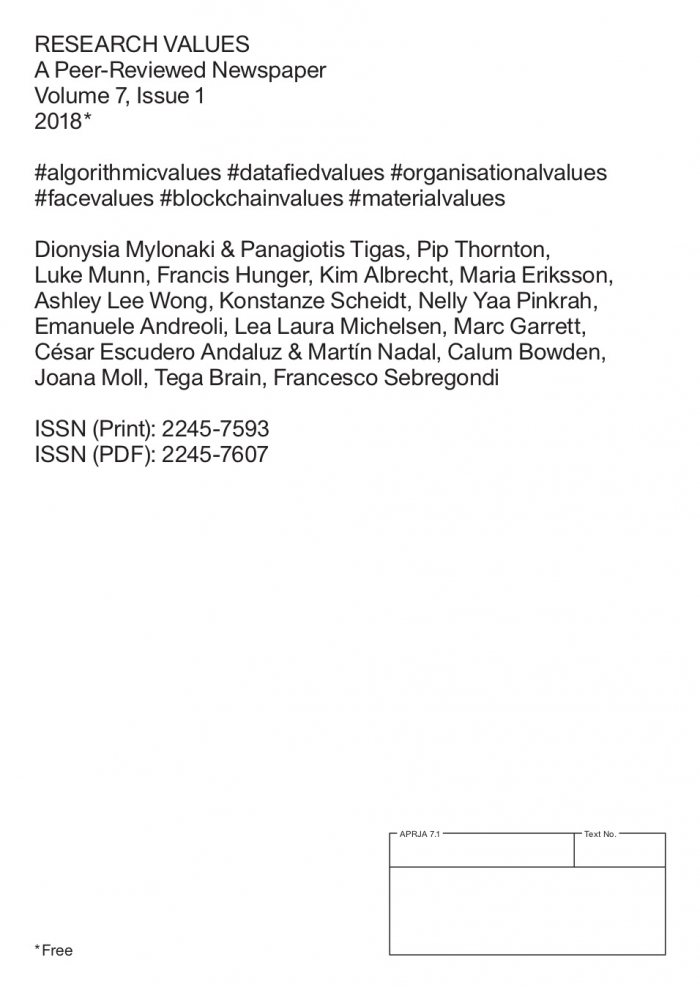
Edited by Christian Ulrik Andersen, César Escudero Andaluz, Emanuele Andreoli, Marie-Luise Angerer, Kim Albrecht, Calum Bowden, Tega Brain, Geoff Cox, Jan Distelmeyer, Maria Eriksson, Marc Garrett, Francis Hunger, Lea Laura Michelsen, Joana Moll, Luke Munn, Dionysia Mylonaki, Martín Nadal, Nelly Yaa Pinkrah, Søren Pold, Konstanze Scheidt, Francesco Sebregondi, Winnie Soon, Pip Thornton, Panagiotis Tigas, Magda Tyzlik-Carver, Ashley Lee Wong
Design: Sarah Garcin & Angeline Ostinelli
ISBN: 87-91810-28-0
EAN: 9788791810282
ISSN (PRINT): 2245-7593
ISSN (PDF): 2245-7607
There is value and there are values. There is the measure of wealth, metrified and calculated in numerous ways, and there are ideas, ethics, preferences of taste, and customs of ideology. […] But what really happens when the two are conflated? How do we understand how the values associated with something give it value; or, how giving something a value affords certain values? And, in what ways are the conflations of value and values tied to the circulation of value and values in contemporary technical infrastructures? […] The articles published in A Peer-Reviewed Journal About Research Values interrogate value and values in ways that respond to techno-cultural shifts and embrace the range of economies that pervade digital culture.
The workshop leading to this publication is a collaboration between Digital Aesthetics Research Centre (Aarhus University), The Brandenburg Centre for Media Studies (ZeM), and transmediale.
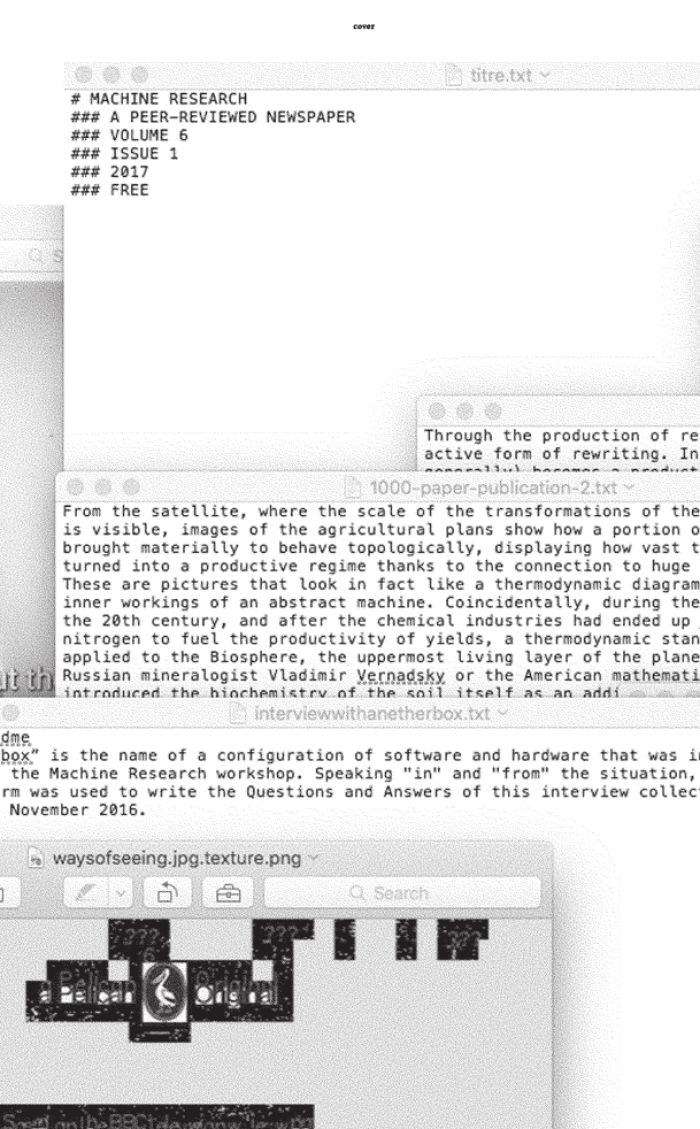
Edited by Roel Roscam Abbing, Christian Ulrik Andersen, Geoff Cox, Maya Ganesh, Abelardo Gil-Fournier, Maja Bak Herrie, John Hill, Brian House, Nathan Jones, Nicolas Malevé, Rosa Menkman, An Mertens, Martino Morandi, Michael Murtaugh, Søren Pold, Søren Rasmussen, Renée Ridgway, Jara Rocha, Sam Skinner, Femke Snelting
Design: Sarah Garcin & Angeline Ostinelli
ISBN: 87-91810-28-0
EAN: 9788791810282
ISSN (PRINT): 2245-7593
ISSN (PDF): 2245-7607
This publication is about MACHINE RESEARCH – research on machines, research with machines, and research as a machine. It thus explores machinic perspectives to suggest a situation where the humanities are put into a critical perspective by machine driven ecologies, ontologies and epistemologies of thinking and acting. It aims to engage research and artistic practice that takes into account the new materialist conditions implied by nonhuman techno-ecologies. These include new ontologies and intelligence such as machine learning, machine reading and listening, systems-oriented perspectives to broadcast communication and conflict, the ethics and aesthetics of autonomous systems, and other post-anthropocentric reconsiderations of materiality and infrastructure.
The workshop leading to this publication is a collaboration between Digital Aesthetics Research Centre (Aarhus University), Constant (a non-profit, artist-run association for art and media based in Brussels), and transmediale.
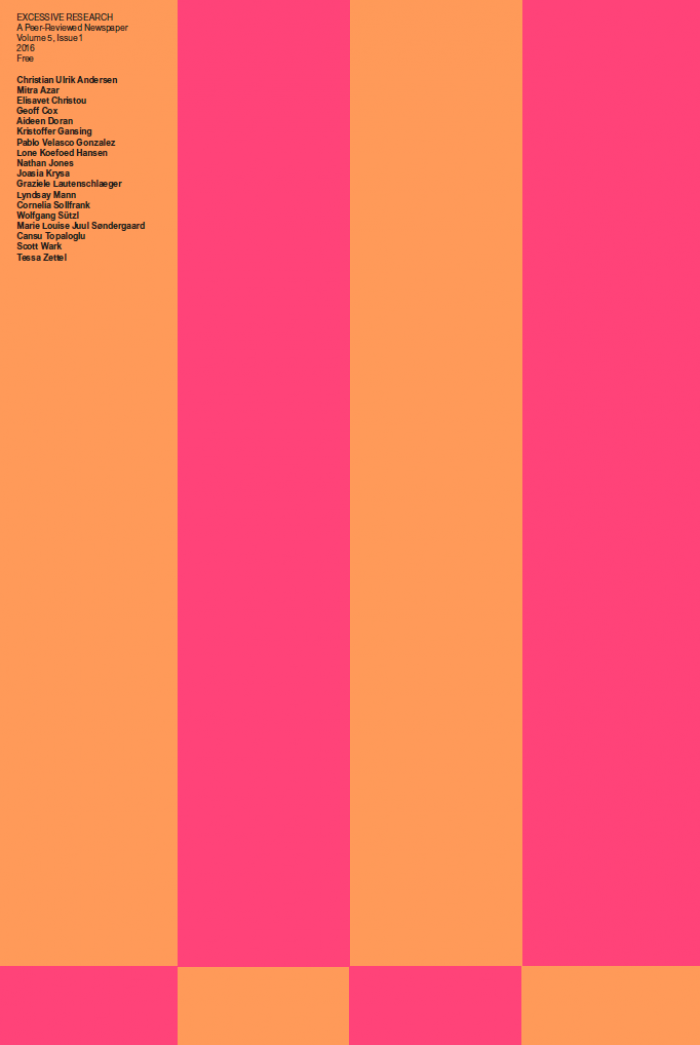
Edited by Christian Ulrik Andersen & Geoff Cox.
Christian Ulrik Andersen, Mitra Azar, Elisavet Christou, Geoff Cox, Aideen Doran, Kristoffer Gansing, Pablo Velasco Gonzalez, Lone Koefoed hansen, Nathan Jones, Joasia Krysa, Graziele Lautenschlaeger, Lyndsay Mann, Cornelia Sollfrank, Wolfgang sützl, Marie Louise Juul Søndergaard, Cansu Topaloglu, Scott Wark, Tessa Zettel
Design: The Laboratory of Manuel Bürger, Manuel Bürger & Hendrike Nagel
ISBN: 7-91810-27-2
EAN: 9788791810275
ISSN (PRINT): 2245-7593
ISSN (PDF): 2245-7607
EXCESSIVE RESEARCH asks: What happens when research is less about exchange and more about excess?
It relates to the announcement of transmediale 2016, Conversation Piece which highlights the compulsive actions of digital culture, and how we are constantly encouraged to stay active, to make, to share and to secure. Following a research workshop in Liverpool, organised in partnership with Liverpool John Moores University and the Liverpool Biennial, this issue of APRJA delves into the nature of these actions and their limits.
The workshop leading to this publication is a collaboration between Digital Aesthetics Research Centre (Aarhus University), Liverpool John Moores University, Liverpool Biennial, and transmediale.
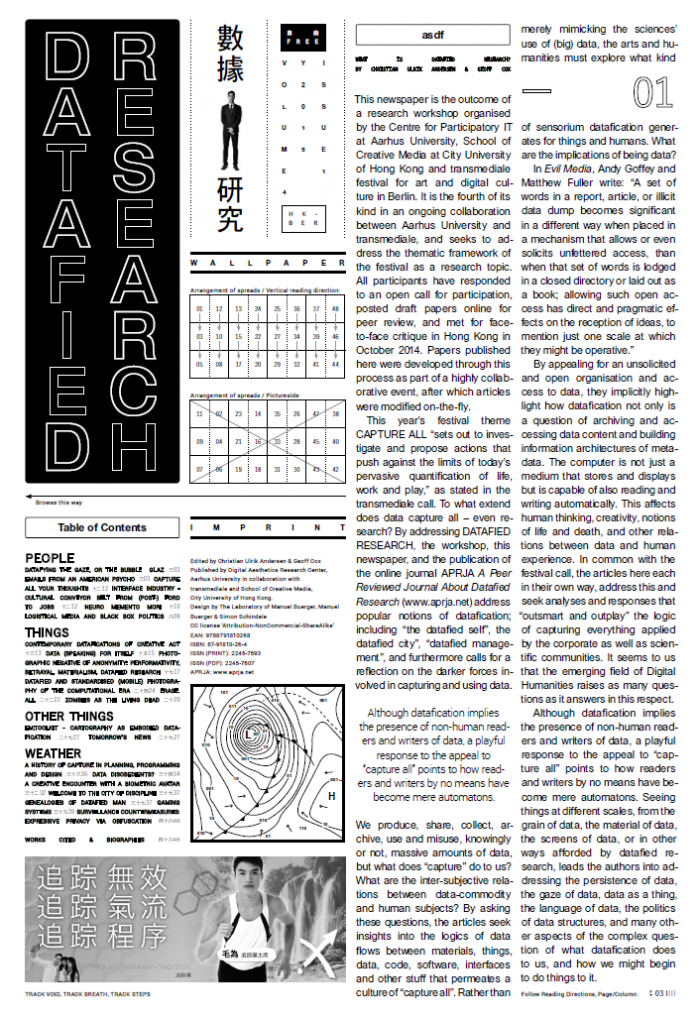
Edited by Christian Ulrik Andersen & Geoff Cox.
Design: The Laboratory of Manuel Bürger
ISBN: 87-91810-26-4
ISSN (PRINT): 2245-7593
ISSN (PDF): 2245-7607
This issue of APRJA examines the implications of datafication for research. Following a research workshop at the School of Creative Media, City University of Hong Kong in October 2014, it addresses the thematic framework of the 2015 transmediale festival “Capture All” as a research topic: “to investigate and propose actions that push against the limits of today’s pervasive quantification of life, work and play”, as the call explains. Indeed, to what extent does data “capture all” – even research?
We produce, share, collect, archive, use and misuse, knowingly or not, massive amounts of data, but what does its “capture” do to us? What are the inter-subjective relations between data-commodity and human subjects? In asking these questions, the articles in this journal seek insights into the logics of data flows between materials, things, data, code, software, interfaces and other stuff that permeates the cultures of datafication. Rather than merely mimicking the sciences’ use of (big) data, the arts and humanities must explore what kind of sensorium datafication generates for things and humans. What are the implications of being data? What are the darker forces involved in capturing and using data?
The layout of this publication comes in the form of a wall-newspaper. The included articles can additionally be downloaded as a text file.
The workshop leading to this publication is a collaboration between Digital Aesthetics Research Centre (Aarhus University), School of Creative Media at City University of Hong Kong, and transmediale.
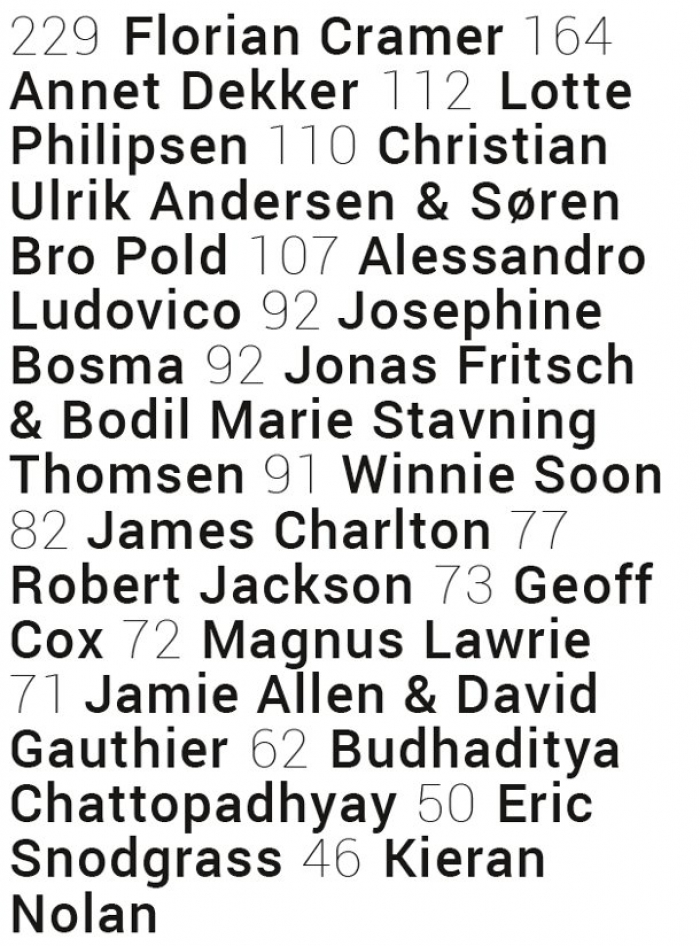
Edited by: Jamie Allen, Christian Ulrik Andersen, Josephine Bosma, James Charlton, Budhaditya Chattopadhyay, Geoff Cox, Florian Cramer, Jonas Fritsch, David Gauthier, Robert Jackson, Magnus Lawrie, Alessandro Ludovico, Kieran Nolan, Georgios Papadopoulos, Lotte Philipsen, Søren Pold, Eric Snodgrass, Bodil Marie Stavning Thomsen, Winnie Soon.
Design: Design by The Laboratory of Manuel Bürger. Manuel Bürger, Timm Häneke, Caroline Wolewinski.
EAN: 9788791810213
ISBN: 87-91810-21-3
ISSN (PRINT): 2245-7593
ISSN (PDF): 2245-7607
Post-digital Research addresses the messy and paradoxical condition of art and media after digital technology revolutions. It critically reflects on the term "post-digital".
The issue is the outcome of a process where a number of researchers, artist-researchers and Ph.D.'s have collaborated in presenting and exchanging ideas around the subject. This follows an earlier call from transmediale festival, Berlin, and a research event at Kunsthal Aarhus. The issue does not present a uniform interpretation of the notion, but includes a variety of positions related to the use of the term, its application within various fields, and how it is reflected in artistic research.
The workshop leading to this publication is a collaboration between Digital Aesthetics Research Centre (Aarhus University) and transmediale. The Workshop was hosted by Kunsthal Aarhus.
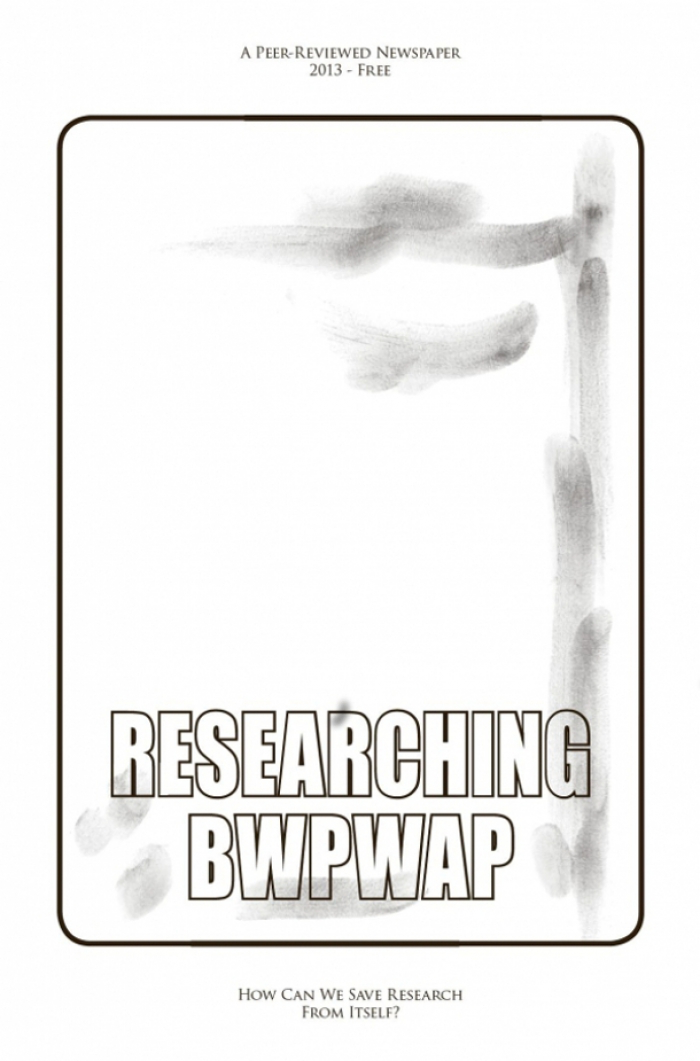
Edited by: Christian Ulrik Andersen, Tatiana Bazzichelli, Armin Beverungen, Geoff Cox, Kristoffer Gansing.
Design: The Laboratory of Manuel Bürger
ISBN: 87-91810-25-6
EAN: 9788791810251
ISSN (PRINT): 2245-7593
ISSN (PDF): 2245-7607
Researching BWPWAP asks what kinds of technological and artistic practices might produce radical effects for an institutionalized research culture? How can we save research from itself?
In referring to the cancellation of Pluto’s planetary status in 2006, BWPWAP (Back When Pluto Was a Planet), the 2013 edition of the transmediale festival interrogates techno-cultural processes of displacement and invention, and asks for artistic and speculative responses to new cultural imaginaries. In light of this, the conference and workshop Researching BWPWAP took place in November 2012 in Lüneburg, Germany, organised jointly by Leuphana University of Lüneburg, Aarhus University and the reSource transmedial culture/transmediale.
This newspaper presents some outcomes of this process, and like the conference and workshop, it can be interpreted in the context of a research culture that has been significantly destabilized by network culture and digital media. Certainly, much research culture has shared Pluto’s fate: conferences reduced to networking events to foster cultural capital, and scholarly communications reduced to impact factors measured by grant givers. In other words, research is not just about measuring the performativity of a single researcher (the peer-reviewed journal system), but also the processes of questioning, investigating, speculating, and sharing between peers in a broader sense.
The workshop leading to this publication is a collaboration between Digital Aesthetics Research Centre (Aarhus University), Leuphana University of Lüneburg, and transmediale.
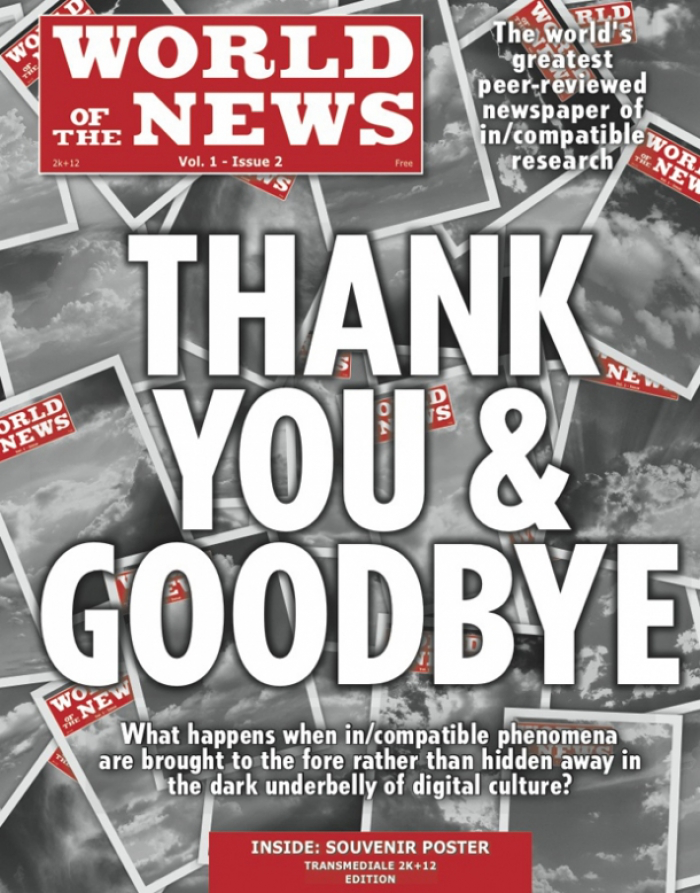
Edited by Christian Ulrik Andersen, Tatiana Bazzichelli, Geoff Cox, Kristoffer Gansing
Design: The Laboratory of Manuel Bürger, Manuel Bürger, Timm Haneke
ISBN: 87-91810-20-5
World of the News – The world’s greatest peer-reviewed newspaper of in/compatible research presents cutting edge in/compatible research in an accessible free tabloid format.
The newspaper partly addresses academia’s increasing demand for publication of academic peer-reviewed journal articles. Perhaps researchers need new visions of how to produce and consume research? The content of the newspaper derives from a PhD workshop and conference held in November 2011, at University of the Arts, Berlin (organized by Aarhus University in collaboration with transmediale/resource for transmedial culture and the Vilém Flusser Archive.
The workshop leading to this publication is a collaboration between Digital Aesthetics Research Centre (Aarhus University), the Vilém Flusser Archive (University of the Arts, Berlin), and transmediale.
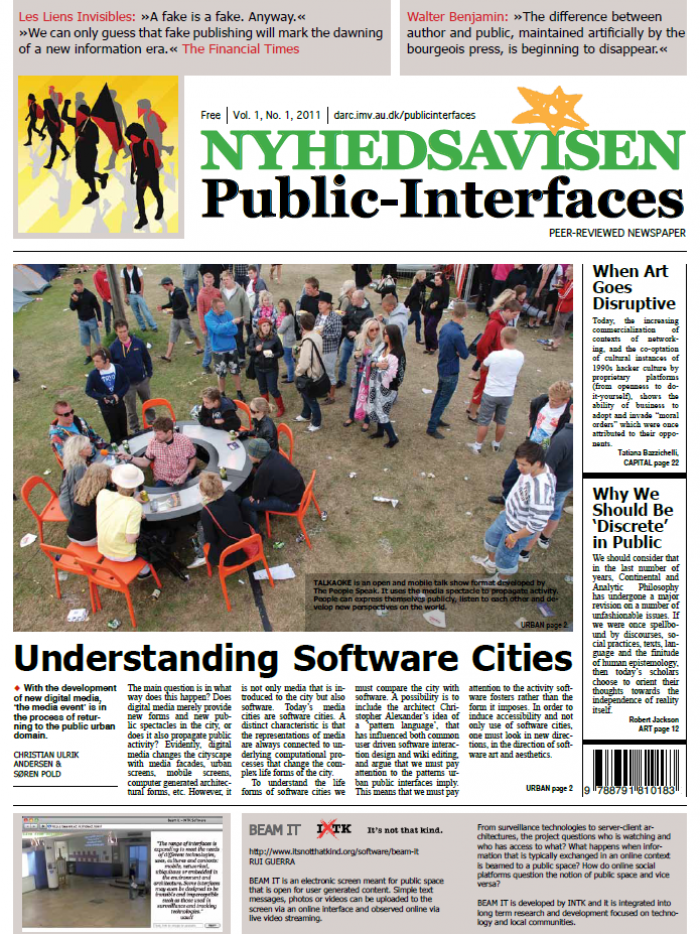
Edited by Christian Ulrik Andersen, Geoff Cox, Jacob Lund
Design: Christian Ulrik Andersen, Geoff Cox, Ida Knudsen
ISBN: 87-91810-18-3 / EAN: 9788791810183
Emerging from ongoing research around interface criticism, the aim of this newspaper is to broaden the topic to encompass the changing concept of the ’public’.
The newspaper is organized into three thematic strands: ART as public interface; the public interfaces of URBAN space; the public interface and CAPITAL. The newspaper brings together researchers within diverse fields – across aesthetics, cultural theory, architecture and urban studies – united by the need to understand public interfaces and the possible paradigmatic changes they pose to these fields.
The workshop leading to this publication is a collaboration between Digital Aesthetics Research Centre (Aarhus University) and Plymouth University.